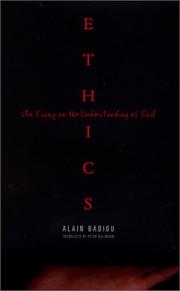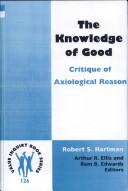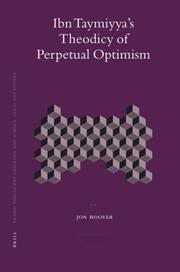| Listing 1 - 10 of 10 |
Sort by
|

ISBN: 1859842976 Year: 2001 Publisher: London Verso
Abstract | Keywords | Export | Availability | Bookmark
 Loading...
Loading...Choose an application
- Reference Manager
- EndNote
- RefWorks (Direct export to RefWorks)
Alain Badiou explodes the facile assumptions behind the recent ethical turn by governments of the West. He shows how our prevailing ethical principles serve to reinforce an ideology of the status quo and ultimately fail to provide a framework for an effective understanding of the fundamental concepts of good and evil. In contrast, Badiou summons up an "ethic of truths" which is designed to sustain and inspire a disciplined, subjective adherence to a militant cause (be it political, scientific, artistic or romantic) and to discern a finely demarcated zone of application for the concept of evil.
Ethics. --- Good and evil. --- Ethics --- Good and evil --- Evil --- Wickedness --- Philosophy --- Polarity --- Religious thought --- Deontology --- Ethics, Primitive --- Ethology --- Moral philosophy --- Morality --- Morals --- Philosophy, Moral --- Science, Moral --- Values
Book
ISBN: 9523690558 952369054X Year: 2021 Publisher: Helsinki Helsinki University Press
Abstract | Keywords | Export | Availability | Bookmark
 Loading...
Loading...Choose an application
- Reference Manager
- EndNote
- RefWorks (Direct export to RefWorks)
The devilish has long been integral to myths, legends, and folklore, firmly located in the relationships between good and evil, and selves and others. But how are ideas of evil constructed in current times and framed by contemporary social discourses? Modern Folk Devils builds on and works with Stanley Cohen’s theory on folk devils and moral panics to discuss the constructions of evil. The authors present an array of case-studies that illustrate how the notion of folk devils nowadays comes into play and animates ideas of otherness and evil throughout the world. Examining current fears and perceived threats, this volume investigates and analyzes how and why these devils are constructed. The chapters discuss how the devilish may take on many different forms: sometimes they exist only as a potential threat, other times they are a single individual or phenomenon or a visible group, such as refugees, technocrats, Roma, hipsters, LGBT groups, and rightwing politicians. Folk devils themselves are also given a voice to offer an essential complementary perspective on how panics become exaggerated, facts distorted, and problems acutely angled.;Bringing together researchers from anthropology, sociology, political studies, ethnology, and criminology, the contributions examine cases from across the world spanning from Europe to Asia and Oceania.
Good and evil. --- Evil --- Wickedness --- Ethics --- Philosophy --- Polarity --- Religious thought --- Public fear --- Exclusion --- Stigmatization --- Moral panic --- Otherness --- Folk devils

ISBN: 1280358599 9786610358595 1597450065 1588294498 Year: 2006 Publisher: Totowa, N.J. : Humana Press,
Abstract | Keywords | Export | Availability | Bookmark
 Loading...
Loading...Choose an application
- Reference Manager
- EndNote
- RefWorks (Direct export to RefWorks)
Many conscientious mental health professionals caring for disturbed patients have either unscientifically formulated for themselves notions of "evil" to explain the behavior of their patients, or have been given patients described by judges and the press as "evil." Although such notions may be deemed unscientific, beyond the purview of medicine, and better suited for discussion by theologians and moral philosophers, the fact remains that these notions of "evil" have a definite impact on the practice of psychiatry, if not all medical fields. In Forensic Psychiatry: Influences of Evil, Tom Mason brings together an international panel of experts from diverse specialties to examine the idea of "evil" in a medical context, specifically a mental health setting, to consider how the concept can be usefully interpreted, and to elucidate its relationship to forensic psychiatry. The authors challenge the belief that the concept of "evil" plays no role in "scientific" psychiatry and is not helpful to our understanding of aberrant human thinking and behavior. Among the viewpoints up for debate are a consideration of organizations as evil structures, the "medicalization" of evil, destruction as a constructive choice, violence as a secular evil, talking about evil when it is not supposed to exist, and the influence of evil on forensic clinical practice. Among the highlights are a psychological exploration of the notion of "evil" and a variety of interesting research methods used to explore the nature of "evil." Illuminating and provocative, Forensic Psychiatry: Influences of Evil offers mental health professionals a challenging survey of how the concept of "evil" can be understood from a variety of viewpoints and integrated into forensic psychiatry.
Forensic psychiatry. --- Good and evil. --- Evil --- Wickedness --- Ethics --- Philosophy --- Polarity --- Religious thought --- Forensic psychiatry --- Medical jurisprudence --- Psychiatry --- Mentally ill offenders --- Law and legislation
Book
ISBN: 019189639X 019260967X 0198864221 0192609661 Year: 2021 Publisher: Oxford : Oxford University Press,
Abstract | Keywords | Export | Availability | Bookmark
 Loading...
Loading...Choose an application
- Reference Manager
- EndNote
- RefWorks (Direct export to RefWorks)
'Non-Identity Theodicy' is as an original response to the problem of evil. It constructs an ethical framework for theodicy by sketching four cases of human action where horrendous evils are either caused, permitted, or risked, either for pure benefit or for harm avoidance.
Theodicy --- Good and evil --- Religious aspects --- Evil, Problem of (Theology) --- God --- Permissive will of God --- Problem of evil (Theology) --- Permissive will --- Will, Permissive --- Theodicy. --- Religious aspects.
Book
ISBN: 9789004510531 9004510532 9789004512061 9004512063 Year: 2022 Publisher: Leiden ; Boston : Brill
Abstract | Keywords | Export | Availability | Bookmark
 Loading...
Loading...Choose an application
- Reference Manager
- EndNote
- RefWorks (Direct export to RefWorks)
In this volume, Hanna Vanonen offers a fresh view to the Milhamah and Sefer ha-Milhamah manuscripts by producing a thorough close-reading analysis of them, paying attention not only to their contents but also to manuscripts as material artifacts. Vanonen demonstrates that studying the stability and instability of the War traditions does more justice to the complex material than a traditional chronological literary-critical model. In addition, Vanonen argues that at least liturgical use and study purposes may have created needs for producing different manuscripts that were simultaneously important.
Good and evil --- Judaism --- History --- Dead Sea scrolls --- War of the Sons of Light against the Sons of Darkness --- History and criticism --- Qumran Site (West Bank) --- Antiquities --- Antiquities. --- Good and evil. --- History and criticism. --- War of the Sons of Light against the Sons of Darkness.
Book
ISBN: 9781783742004 9781783742011 1783742003 1783742011 1783741996 9781783741991 9781783741991 1783741996 9781783741984 1783741988 9781783742028 178374202X 282188169X Year: 2016 Publisher: Open Book Publishers
Abstract | Keywords | Export | Availability | Bookmark
 Loading...
Loading...Choose an application
- Reference Manager
- EndNote
- RefWorks (Direct export to RefWorks)
"Metaethics from a First Person Standpoint addresses in a novel format the major topics and themes of contemporary metaethics, the study of the analysis of moral thought and judgement. Metathetics is less concerned with what practices are right or wrong than with what we mean by 'right' and 'wrong.' Looking at a wide spectrum of topics including moral language, realism and anti-realism, reasons and motives, relativism, and moral progress, this book engages students and general readers in order to enhance their understanding of morality and moral discourse as cultural practices. Catherine Wilson innovatively employs a first-person narrator to report step-by-step an individual's reflections, beginning from a position of radical scepticism, on the possibility of objective moral knowledge. The reader is invited to follow along with this reasoning, and to challenge or agree with each major point. Incrementally, the narrator is led to certain definite conclusions about 'oughts' and norms in connection with self-interest, prudence, social norms, and finally morality. Scepticism is overcome, and the narrator arrives at a good understanding of how moral knowledge and moral progress are possible, though frequently long in coming. Accessibly written, Metaethics from a First Person Standpoint presupposes no prior training in philosophy and is a must-read for philosophers, students and general readers interested in gaining a better understanding of morality as a personal philosophical quest."--Publisher's website.
Metaethics. --- Ethics. --- Deontology --- Ethics, Primitive --- Ethology --- Moral philosophy --- Morality --- Morals --- Philosophy, Moral --- Science, Moral --- Philosophy --- Values --- Meta-ethics --- Ethics --- Knowledge, Theory of --- moral judgement --- moral knowledge --- metaethics --- moral philosophy --- Abortion --- Ethical egoism --- Good and evil --- Human

ISBN: 904201220X 9004496106 Year: 2021 Volume: 126 Publisher: Brill
Abstract | Keywords | Export | Availability | Bookmark
 Loading...
Loading...Choose an application
- Reference Manager
- EndNote
- RefWorks (Direct export to RefWorks)
This book presents Robert S. Hartman’s formal theory of value and critically examines many other twentieth century value theorists in its light, including A.J. Ayer, Kurt Baier, Brand Blanshard, Paul Edwards, Albert Einstein, William K. Frankena, R.M. Hare, Nicolai Hartmann, Martin Heidegger, G.E. Moore, P.H. Nowell-Smith, Jose Ortega y Gasset, Charles Stevenson, Paul W. Taylor, Stephen E. Toulmin, and J.O. Urmson.
Bien et mal --- Evil [Problem of ] --- Goed en kwaad --- Good and evil --- Kwaad [Probleem van het ] --- Mal [Problème du ] --- Probleem van het kwaad --- Problem of evil --- Problème du mal --- Valeurs (Philosophie) --- Values --- Waarden (Filosofie) --- Values. --- Axiology --- Worth --- Aesthetics --- Knowledge, Theory of --- Metaphysics --- Psychology --- Ethics --- Philosophy --- 19th & 20th Century Philosophy --- Ethics & Moral Philosophy
Book
ISBN: 0191841617 0198803435 0192525174 Year: 2017 Publisher: Oxford : Oxford University Press,
Abstract | Keywords | Export | Availability | Bookmark
 Loading...
Loading...Choose an application
- Reference Manager
- EndNote
- RefWorks (Direct export to RefWorks)
The descriptions 'good' and 'bad' are examples of thin concepts, as opposed to 'kind' or 'cruel' which are thick concepts. Simon Kirchin provides one of the first full-length studies of the crucial distinction between 'thin' and 'thick' concepts, which is fundamental to many debates in ethics, aesthetics and epistemology.
Evaluation. --- Assessment --- Research --- Ethics. --- Metaethics. --- Meta-ethics --- Ethics --- Knowledge, Theory of --- Deontology --- Ethics, Primitive --- Ethology --- Moral philosophy --- Morality --- Morals --- Philosophy, Moral --- Science, Moral --- Philosophy --- Values --- descriptive content --- evaluation --- ethics --- thick concepts --- thin concepts --- aesthetics --- Genus --- Good and evil --- Non-cognitivism --- Semantics --- Separation of church and state --- Species
Book

ISBN: 9400600119 Year: 2011 Publisher: Amsterdam : Amsterdam University Press,
Abstract | Keywords | Export | Availability | Bookmark
 Loading...
Loading...Choose an application
- Reference Manager
- EndNote
- RefWorks (Direct export to RefWorks)
Gog and Magog, as archetypes of evil, have dwelt in our consciousness since their threatening appearance in the Bible and Quran. Maps, literature and texts ranging from Medieval Europe, the Byzantine and Arab world, in Berber, Persian and Indonesian traditions, to contemporary internet texts: all use these imaginary monstrous creatures. The figures are constantly reinterpreted as the enemies of order change. Gog and Magog have been represented with dog heads, snake tongues. On the covers of contemporary Arab apocalyptic literature they may be giants or half-humans.This volume Embodiments of Evil: Gog and Magog reveals in eight essays the images of the ‘Other’ in genres ranging from contemporary folk religion on the internet to the rich literary heritage of Alexander romances.
Apocalyptic literature. --- End of the world (Islam) --- End of the world (Islam). --- End of the world --- Eschatology. --- Gog en Magog --- Good and evil in literature. --- Other (Philosophy) in literature. --- LITERARY CRITICISM / Middle Eastern. --- Biblical teaching. --- gtt. --- Literary Criticism, Culture Studies, Gog and Magog. --- Last things (Theology) --- Religious thought --- Theology, Doctrinal --- Evil in literature --- Good in literature --- Islamic eschatology --- Literature, Apocalyptic --- Literature

ISBN: 9004158472 9786612397080 1282397087 9047420195 9789047420194 9789004158474 Year: 2007 Volume: 73 Publisher: Leiden ; Boston : Brill,
Abstract | Keywords | Export | Availability | Bookmark
 Loading...
Loading...Choose an application
- Reference Manager
- EndNote
- RefWorks (Direct export to RefWorks)
The Muslim jurist Ibn Taymiyya (d. 1328) is famous for polemic against Islamic philosophy, theology and rationalizing mysticism, but his positive theological contribution has not been well understood. This comprehensive study of Ibn Taymiyya’s theodicy helps to rectify this lack. Exposition and analysis of Ibn Taymiyya’s writings on God’s justice and wise purpose, divine determination and human agency, the problem of evil, and juristic method in theological doctrine show that he articulates a theodicy of optimism in which God in His essence perpetually wills the best possible world from eternity. This sets Ibn Taymiyya’s theodicy apart from Ashʿarī divine voluntarism, the free-will theodicy of the Muʿtazilīs, and the essentially timeless God of other optimists like Ibn Sīnā and Ibn ʿArabī.
Ibn Taym ̄iyah, Ahmad ibn � al-Hal ̄im, 1263-1328. --- Theodicy -- Biblical teaching. --- Theodicy. --- God (Islam) --- Good and evil --- Islam --- Optimism. --- History of doctrines. --- Religious aspects --- Islam. --- Doctrines. --- Ibn Taymīyah, Aḥmad ibn ʻAbd al-Ḥalīm, --- Evil, Problem of (Theology) --- God --- Permissive will of God --- Problem of evil (Theology) --- Allah --- Monotheism (Islam) --- Dogma, Islamic --- Islamic theology --- Kalam --- Muslim theology --- Theology, Islamic --- Theology, Muslim --- Good and evil (Islam) --- Permissive will --- Will, Permissive --- Aḥmad ibn ʻAbd al-Ḥalīm ibn Taymīyah, --- Ḥarrānī, Aḥmad ibn ʻAbd al-Ḥalīm, --- Ibn Taymīyah, Taqī al-Dīn, --- Taqijuddin Ibnu Taimyah, --- Aḥmad ibn ʻAbd al-Ḥalīm al-Ḥarrānī, --- Taqī al-Dīn ibn Taymīyah, --- Ibnu Taimiyah, Taqijuddin, --- Ibn Taymīyah, --- Taqi al-Din Ahmad ibn Taymiyya, --- Ibn Taymiyya, Taqi al-Din Ahmad, --- Ibn Taymiyya, --- Ibn Taimiyyah, --- Ibn Taymiyyah, --- Ibn Taimiyah, --- Ibn-i Taimīyah, --- Ibn-e-Taimiya, --- Ibne Taimiyah, --- أبن تيميه، أحمد بن عبدالحليم --- أبي العباس تقي الدين أحمد بن عبد الحايم ابن تيمية الحراني --- أحمد بن تيمية --- أحمد بن عبد الحليم --- أحمد بن عبد الحليم ابن تيمية، --- أحمد بن عبد الحليم بن تيمية --- إبن تيمية، احمد بن عبد الحليم --- إبن تيمية، احمد عبد الحليم --- إبن تيميه، أحمد بن عبد الحليم --- ابن تمية، أحمد بن عبد الحليم --- ابن تيمية، أحمد --- ابن تيمية، أحمد ابن عبد الحليم، --- ابن تيمية، أحمد بن عبد الحليم بن عبد السلام --- ابن تيمية، أحمد بن عبد الحليم، --- ابن تيمية، أحمد عبد الحليم، --- ابن تيمية، احمد ابن عبدالحليم، --- ابن تيمية، احمد بن عبد الحليم، --- ابن تيمية، محمد بن عبد الحليم --- ابن تيميه، أحمد بن عبد الحليم، --- ابن تيميه، احمدابن عبدالحليم --- بن تيمية، أحمد ابن عبد الحليم، --- بن تيمية، أحمد بن الحليم، --- بن تيمية، أحمد بن عبد الحليم، --- بن تيمية، احمد بن عبد الحليم، --- تقي الدين أبي العباس أحمد بن تيمية --- تقي الدين أحمد بن تيمية --- تقي الدين أحمد بن عبد الحليم بن تيمية --- تقي الدين ابو العباس احمد بن عبد الحليم بن تيمية --- Ibn-i Taimiyah al-Ḥarānī, Aḥmad bin ʻAbdulḥalīm, --- ابن تيميه الحرانى، احمد بن عبد الحليم، --- ابن تيميه، --- Ibn Taymīya, Taqī al-Dīn Aḥmad ibn ʻAbd al-Ḥalīm, --- Personality --- Philosophy --- Cheerfulness --- Ibn Taymīya, Taqī al-Dīn Aḥmad ibn ʻAbd al-Ḥalīm, - 1263-1328 --- islam --- Avicenna --- God in Islam --- Ibn Taymiyyah --- Sheikh --- ابن تيميه الحرانى، احمد بن عبد الحليم، --- ابن تيميه،
| Listing 1 - 10 of 10 |
Sort by
|

 Search
Search Feedback
Feedback About
About Help
Help News
News